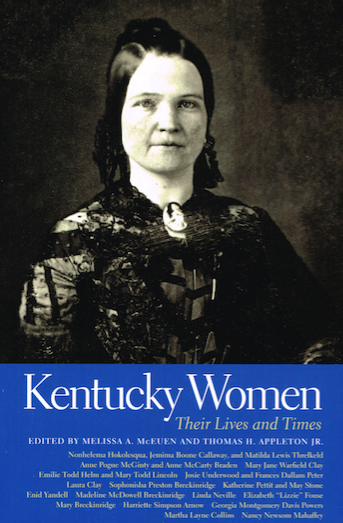Part 2 of a three-part series
by Debra Meyers
Special to NKyTribune
A new book entitled, Kentucky Women: Their Lives and Times, provides us with a welcome opportunity to examine the role of women in our gateway state. Melissa McEuen and Thomas Appleton have compiled this fascinating collection of Kentucky women’s biographies, published this year by the University of Georgia Press.
As a largely overlooked border state, Kentucky deserves a book like this. Indeed, Kentucky women’s experiences have had a significant impact on American society. Eighteen contributors provide us with essays fostering a better understanding of a wide range of women’s experiences from frontier times to the present day.
Kentucky Women: Their Lives and Times is a tantalizing glimpse into the cultural contributions made by black and white women from various backgrounds throughout Kentucky. The book attempts to cover as much geography as possible, paying particular attention to the often-neglected Appalachian region in the east and the Pennyroyal in the west.
The authors have revealed the lives of women of note, as well as ordinary women’s experiences. The result is far-reaching, representing contributions in the areas of politics, economics, religion, medicine, social work, education, the arts, literature, and social justice activism.
Primary sources by the women of the biographical sketches enliven the book. There are letters, diaries, autobiographies, interviews, and other personal and public records.
I found “The Power of Place across Four Centuries,” by Catherine Fosl, particularly interesting. She focuses on two distant relatives—Anne Pogue McGinty and Anne McCarty Braden. Anne Pogue McGinty followed Daniel Boone into Kentucky in 1775. In addition to being a hard-scrapple frontier settler, McGinty is credited with bringing the first spinning wheel across the Cumberland Gap and operating the first tavern in Harrodsburg. Anne worked on the family farm and tavern while developing the popular “linsey-woolsey” cloth—made from nettle and buffalo wool—that would clothe many pioneers.
A trailblazer in her own right, Anne McGinty’s legacy had a significant impact on Anne McCary Braden’s life. Fosl uses Anne Pogue McGinty’s story to help the reader navigate Anne McCary Braden’s transition from a conservative southern woman to a radical 20th-century civil rights activist. She notes, “it is impossible to make sense of Anne Braden’s choices in the twentieth century without first understanding the depth of her roots in Kentucky and the origins of her steadfast claim, as a Kentuckian, to a southern identity” (p. 44).
The origin of Braden’s southern identity was formed while listening to her grandmother recount family stories that often included Anne Pogue McGinty. Braden devoted much of her adult life to ending white supremacy. And while Braden’s civil rights activism would have been nearly incomprehensible to her pioneer ancestor, Fosl argues that it was the memory of strong independent female ancestors that helped to lay the foundation for Braden’s social justice work.
Carolyn Dupont wrote an essay on politician Georgia Montgomery Davis Powers, Dupont claims that Powers “departed from important norms that constrained and defined the behavior of other black female activists.” She “ignored the gender and racial standards that had long dictated the fitness of black women for entry into any public role” (p. 339). As the first African-American woman elected to the Kentucky Senate, Georgia Montgomery Davis Powers worked hard for black Kentuckians. Her productive 21 years of service to the black community in the Senate, however, often pales in comparison to her notoriety as Martin Luther King Jr.’s lover.
Other exceptional essays in this collection include: Juilee Decker’s biography of sculptor Enid Yandell, Anya Jabour’s “Homegrown Heroine” Sophonisba Preston Breckinridge, and Andrea Watkins’ “Two Union Women in Civil War Kentucky.”
Decker reviews Enid Yandell’s major artistic work, a larger-than-life depiction of Daniel Boone created for the Columbian Exhibition in Chicago (1892). In addition, Yandell was an educator and a philanthropist. She provided humanitarian aid during World War I, taught students, and provided progressive administration to an art school for many years. Her long list of accomplishments makes one wonder why a lengthy exploration of her life has not been completed to date.
Similarly, Sophonisba Preston Breckinridge’s lifelong commitment to helping the oppressed earns the recognition that it deserves in this book. Breckinridge pressed for personalizing and professionalizing social work and public welfare agencies. Having the advantage of several graduate degrees, she employed social science data to lobby for dramatic progressive legislation and social change at the turn of the 20th century. Jabour emphasizes Breckinridge’s personal and professional relationship with her life partner, Edith Abbott, as well as her family connections as a major and unrecognized contribution to her social activism at the state and national levels.
Andrea Watkins, on the other hand, carefully examines the private lives of two ordinary Kentucky women who identified with the Union cause. Watkins uncovers the complexity of living in a border state during the Civil War. The lives of these women dispel many long-held myths regarding Union beliefs and values toward slavery and family.
Certainly, any collection of essays that hopes to cover the entire state of Kentucky — with its urban and rural diversity as well as racial and cultural divides from pioneer days to the present—cannot possibly address every great woman’s contribution. But this collection has done a remarkable job of providing a glimpse into the importance of women’s contributions to both the state’s progress as well as the nation’s. Kentucky Women: Their Lives and Times would make a great Christmas gift for those interested in either women’s or Kentucky history.
Debra Meyers, PhD is Professor of History, Women’s, and Religious Studies at Northern Kentucky University.


























